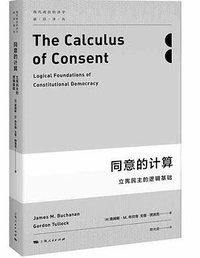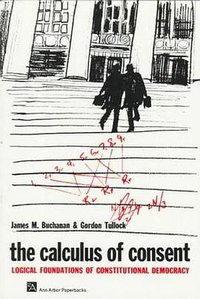The Calculus of Consent
豆瓣
Logical Foundations of Constitutional Democracy: 3
James M. Buchanan
简介
The Calculus of Consent was co-authored by Buchanan with Gordon Tullock, with whom Buchanan collaborated on many books and academic enterprises throughout their careers. As Robert D. Tollison states in the foreword, “[this book] is a radical departure from the way democracies conduct their business. The Calculus is already a book for the ages.”
This classic work analyzes the political organization of a free society through the lens of the economic organization of society. The authors acknowledge their unease as economists in analyzing the political organization, but they take the risk of forging into unfamiliar territory because they believe the benefits of their perspective will bear much fruit.
As the authors state, their objective in this book is “to analyze the calculus of the rational individual when he is faced with questions of constitutional choice . . . .We examine the [choice] process extensively only with reference to the problem of decision-making rules.”
The authors describe their approach as “economic individualism.” They believe that economists have explored individual choice extensively in the market sector while social scientists have largely ignored the dynamics of individual decision-making in the dynamics of forming group action in the public sector.
Written in the early 1960s, The Calculus of Consent has become a bulwark of the public choice movement for which James M. Buchanan is so justly famous.
contents
Foreword ix
Preface xv
I. The Conceptual Framework
1. Introduction 3
2. The Individualistic Postulate 11
3. Politics and the Economic Nexus 16
4. Individual Rationality in Social Choice 31
II. The Realm of Social Choice
5. The Organization of Human Activity 43
6. A Generalized Economic Theory of Constitutions 63
7. The Rule of Unanimity 85
8. The Costs of Decision-Making 97
III. Analyses of Decision-Making Rules
9. The Structure of the Models 119
10. Simple Majority Voting 132
11. Simple Majority Voting and the Theory of Games 149
12. Majority Rule, Game Theory, and Pareto Optimality 172
13. Pareto Optimality, External Costs, and Income Redistribution 190
14. The Range and Extent of Collective Action 200
15. Qualified Majority Voting Rules, Representation, and the Interdependence of Constitutional Variables 210
16. The Bicameral Legislature 231
17. The Orthodox Model of Majority Rule 247
IV. The Economics and the Ethics of Democracy
18. Democratic Ethics and Economic Efficiency 265
19. Pressure Groups, Special Interests, and the Constitution 282
20. The Politics of the Good Society 295
Appendix 1. Marginal Notes on Reading Political Philosophy, by James M. Buchanan 305
Appendix 2. Theoretical Forerunners, by Gordon Tullock 326 Name Index 351
Subject Index 353



